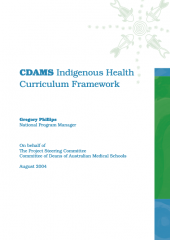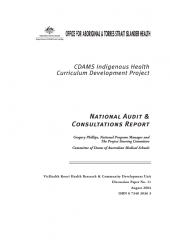Purpose
The CDAMS Indigenous Health Curriculum Framework was published in 2004, and was informed by the national curriculum workshop, where the issues implicit in developing an Indigenous Health curriculum framework were considered, in close consultation with medical educators, Indigenous health specialists, the Australian Indigenous Doctors’ Association, medical colleges, student bodies, and other stakeholder organisations such as the Australian Rural Health Education Network.
This workshop looked at findings from a national audit of medical schools, which aimed to assess existing Indigenous health content in curricula and its delivery context. The audit was conducted as part of the CDAMS Indigenous Health Curriculum Development Project (later referred to as the Medical Deans Indigenous Health Project). The National Audit and Consultation Report (see below) was published in August 2004.
The purpose of the CDAMS Indigenous Health Curriculum Framework is to provide a set of guidelines for medical schools to aid the development and delivery of Indigenous health content in core medical education. It is recognised that this is an emerging field and that medical schools are at differing stages of curriculum development. This document seeks to enunciate the basic components of a functional curriculum for delivering Indigenous health effectively.
Rationale
Aboriginal and Torres Strait Islander Peoples are the First Peoples of Australia, and deserve to be respected as such. Indigenous Australians have contributed much to the broader public good in politics, the arts, environmental movements, sports, cultural awareness and understandings of spirituality and place. Further, Indigenous Australians have shown incredible resilience by continuing to work in many ways to recover from the on-going impacts of colonisation. One of the impacts of colonisation is the poor health outcomes of Indigenous Australians and it is the intention that this curriculum framework go some way to improving student outcomes and attributes in Indigenous health. This project responds to recommendations from numerous studies, inquiries, reports, policies and strategies emerging from the fields of Indigenous health, medical education and medical workforce development. Over the decades, these documents have gradually, and then consistently, recommended the development and strengthening of training for medical professionals in both core and vocational education regarding the health and well-being of Aboriginal and Torres Strait Islander Australians.
The Project Steering Committee and stakeholders in this Project believed that a better informed medical education sector regarding Indigenous health issues will translate into better educational outcomes for medical students, which may, in turn, contribute to better health outcomes for Indigenous Australians. This curriculum framework, then, becomes an investment in the future of not only the health and well-being of Aboriginal and Torres Strait Islander peoples and communities, but the training of a more competent medical workforce, and an improvement in the health status of all Australians. It is exciting and proper that medical schools are playing a critical role in this regard.







